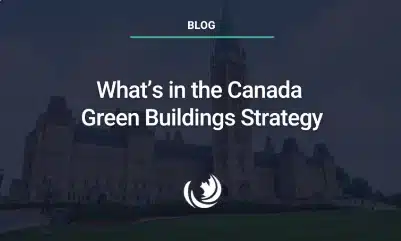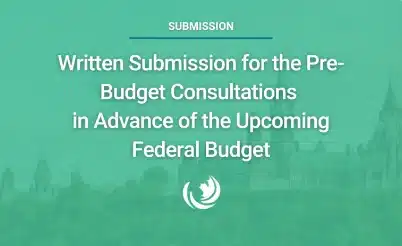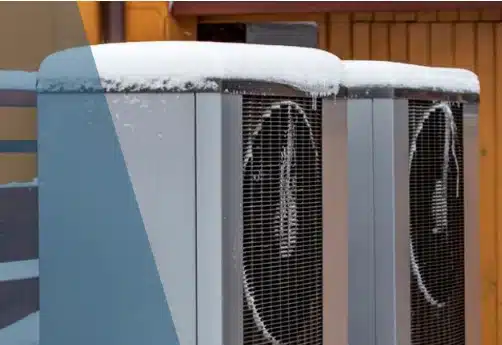New Blog: Delayed Green Buildings Strategy Won’t Meet Net-Zero Emissions

The Federal Government has unveiled its Canada Green Buildings Strategy, aimed at promoting affordable, healthy, and climate-resilient green buildings. Despite acknowledging the need for substantial investments and increased retrofit rates, the Strategy falls short of providing the necessary public investments or regulatory measures to achieve net-zero emissions. Key areas for advancement include modernizing the Energy Efficiency Act, phasing out heating oil, replacing traditional air conditioners with heat pumps, and ensuring federally funded housing adheres to high-performance building codes. However, without clear regulatory pathways or new investments, the Strategy may struggle to meet its ambitious goals.
New Federally Funded Initiatives Announced within the Canada Green Buildings Strategy
The Canada Green Buildings Strategy (CGBS) has introduced several key federally funded initiatives to advance greener, energy-efficient buildings. The Codes Acceleration Fund (CAF) will allocate nearly $3 million to Vancouver for new emission regulations and over $1.6 million to Passive House Canada for high-performance building materials. The Deep Retrofit Accelerator Initiative (DRAI) will provide $13.6 million to the Zero Emissions Innovation Centre to expedite deep retrofit projects in British Columbia. The Toward Net-Zero Homes and Communities Program (TNZ) includes $550,000 for factory-built home development and $586,040 for training “Energy Champions” in First Nations communities.
Efficiency Canada’s 2025 Federal Budget Submission

Follow-Up on the Cool Way to Heat Homes Report

The Building Decarbonization Alliance (BDA) released new resources related to the Cool Way to Heat Homes report we published together last summer. The report outlined the potential benefits of implementing a policy which would require all newly installed central air conditioners in Canada to be heat pumps instead to achieve energy cost savings and emission reductions. While the proposed policy is being well received, stakeholders have raised concerns about the incremental costs to homeowners and the ability for manufactures and distributors to ramp up the availability of heat pumps to meet the new demand. The BDA gathered feedback from manufacturers and distributors on the feasibility of this policy.
Third Intake for Green and Inclusive Community Buildings Program
The Green and Inclusive Community Buildings (GICB) program is now accepting applications for its third intake. Small and medium-sized retrofit projects with eligible costs between $100,000 and $2.99 million can apply from August 1 to October 16, 2024. Large retrofit projects and new builds, ranging from $3 million to $25 million, will be open for applications from September 4 to October 16, 2024. The GICB program, with its recent $500 million top-up, aims to enhance community buildings by improving energy efficiency, reducing emissions, and fostering resilience to climate change.
Addressing Extreme Heat for Low-Income Renters
Efficiency Canada’s Director of Action Research, Abhilash Kantamneni, was quoted in a recent article discussing the challenges faced by low-income renters in coping with extreme heat. He highlighted the “split incentive problem,” where landlords, who own the properties, lack motivation to invest in energy-efficient upgrades since tenants, who pay the utility bills, cannot make these improvements themselves. The article states that while air conditioning is a critical tool, it is not a complete solution. Experts argue that integrating passive cooling methods, such as reflective roofing and better insulation, is essential for long-term comfort and energy efficiency.
New Report from Clean Energy Canada: The Scenic Route

Clean Energy Canada’s latest report highlights the significant cost savings and growing affordability of electric vehicles (EVs) over internal combustion engine (ICE) vehicles, thanks to government incentives and decreasing technology costs. Charging an EV today costs the equivalent of $0.40 per litre of gasoline, a price not seen since the ’90s gas wars. Findings suggest that owning an EV can save drivers around $3,000 per year.
New Study: Replacement of Air-Conditioners with Cold Climate Air-Source Heat Pumps: Pilot Project in The Region of Peel
This study examined six homes in The Region of Peel, Ontario, with CCASHPs installed alongside existing furnaces. CCASHPs provide both heating and cooling, and they were installed in the study homes to replace aging air-conditioner units.
Limited Rate Increases and Tools to Reduce Electricity Bills in Quebec
Hydro-Québec has submitted its rate application for increases effective April 1, 2025. Proposed rate hikes are 3% for residential customers, 3.9% for commercial customers, and 3.3% for large industrial customers. Despite these increases, Hydro-Québec is introducing new initiatives to help customers lower their bills through enhanced energy efficiency incentives. These include a voluntary incentive rate to save up to $350 annually for shifting consumption, tripling the energy efficiency budget to $500 million by 2025, and facilitating self-generation with solar panels. Special attention will be given to low-income households, ensuring they are not impacted by higher rates for overconsumption. The public hearing and review by the Régie de l’énergie will occur from September to December, with a decision expected by March 2025.
New Retroactive Enbridge Home Efficiency Rebate Program

In July, Enbridge Gas introduced its new Home Efficiency Rebate (HER) program, offering up to $5,000 in rebates for energy efficiency upgrades. Eligible Enbridge gas customers who completed an EnerGuide Pre-audit since February 6, 2024, can access rebates for home improvements like insulation, air sealing, and heat pumps. Solar upgrades are not covered. The program is delivered by a reduced list of service organizations, so eligible participants must use one of the eight approved organizations.
Read more about the program here and here | Apply for the program here
Virtual Power Plants: Get Paid to Use Less Power During Heat Waves

Virtual power plants are transforming how we manage electricity demand during peak periods, such as heat waves. These systems allow utility companies to remotely adjust devices like smart thermostats and water heaters to reduce strain on the grid. By participating, users can receive incentives, such as gift cards, while helping to balance energy supply and demand. Ontario’s Peak Perks program is the largest initiative of its kind in Canada, but similar programs are emerging across the U.S. and Canada, highlighting a shift toward using smart technology to enhance energy efficiency and manage peak loads effectively.
BCHydro to Offer Rebates for Solar Panels and Battery Storage
BC Hydro will now offer up to $10,000 in rebates for homeowners who install qualifying rooftop solar panels and battery storage systems. This first-of-its-kind program in B.C. will provide up to $5,000 for solar photovoltaic panels and an additional $5,000 for battery storage. The utility also plans to extend the program to apartment buildings, small businesses, social housing, and Indigenous communities, with rebates up to $150,000. Participants can also register to send excess energy into the grid for future consumption credits. This initiative aims to meet the growing energy demand in BC and support the transition to clean energy sources.
BC Utilities Commission Approves Energy-Based Rates for FortisBC’s EV Charging Stations
Starting August 1, 2024, drivers using FortisBC’s EV charging stations will pay based on the actual amount of electricity they use rather than a per-minute rate. The new energy-based rate of $0.39 per kilowatt hour ensures consistent pricing regardless of charging speed. This change, approved by the British Columbia Utilities Commission, aligns with other public charging services in BC and supports the province’s climate action goals. FortisBC, which operates 42 fast charging stations, aims to reduce greenhouse gas emissions by investing in low- and zero-carbon transportation infrastructure.
